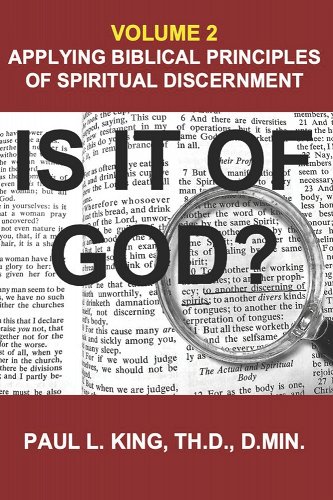Paul King: Is It Of God? Vol 2
 Paul L. King, Is It Of God? Applying Biblical Principles of Spiritual Discernment, Volume 2 (Owasso, OK: Paul King Ministries, 2021), 426 pages, ISBN 9798537657590.
Paul L. King, Is It Of God? Applying Biblical Principles of Spiritual Discernment, Volume 2 (Owasso, OK: Paul King Ministries, 2021), 426 pages, ISBN 9798537657590.
Dr. Paul King is a man with diverse ministry experience, he is both an academician and a practitioner. He has two doctoral degrees and has taught at a number of institutions of higher learning (which are listed on the dedication page of the book), including Oral Roberts University and the Assemblies of God Theological Seminary. He is also an experienced writer. In addition to the book that it the subject of this review, he has written others including: Finding Your Niche: 12 Keys to Opening God’s Doors for Your Life, Moving Mountains: Lessons in Bold Faith From Great Evangelical Leaders, and Anointed Women: The Rich Heritage of Women in Ministry in the Christian & Missionary Alliance. King also has practical ministry experience having served as a pastor. His denominational affiliation is with the Christian & Missionary Alliance.
As the later part of the subtitle of this current volume indicates, this is the second book that King has written on this subject. Volume one was published in 2019. In both books the author’s goal is to help believers in the process of spiritual discernment. The Bible instructs us to be discerning (1 John 4:1) but it is not always easy to do. This is especially the case when what we are hearing or seeing cannot explicitly be found in Scripture. King offers guidance in dealing with matters that are less clear. A tool that he employs is “the traffic light model.” If a belief or practice can be soundly supported from Scripture we may proceed with confidence, we have a green light. In short, it is of God. If we are less confident that what we are seeing or hearing is confirmed by Scripture we may have a yellow light. In this case we can proceed with the discernment process until it becomes clear one way or the other if it is of God. If we find it is not of God, we reject it as false. A belief or practice that is contrary to Scripture or not in harmony with it, or if it fails other criteria in the discernment process it is a red light: stop. The teaching or experience is not of God. The subject of spiritual discernment, while important for all believers, may be particularly relevant to Pentecostal and Charismatic Christians. This is because in meetings of these groups of believers one sometimes encounters unusual things. The author seeks to help readers in their quest for truth.
The Bible instructs us to be discerning but it is not always easy to do. This is especially the case when what we are hearing or seeing cannot explicitly be found in Scripture.
King is seeking to offer biblical discernment and he submits his conclusions humbly and prayerfully.
After reading the opening chapter I think reading through the rest of the book is the best course of action. However, with at least a basic grasp of the discernment process the reader will be in a better position to profitably read any chapter that he or she chooses. No doubt different readers will have different interests. I found some of the material in the chapter “Can a Christian Have a Demon” to be very informative.
As readers make their way through the various chapters of this book, they will encounter a lot of Scripture and much to think about, some of which they may not have previously considered. The author knows the Bible, church history, and he is familiar with the writings of other authors. I dare say that one can learn a lot from this volume. This book will be a help to many who may not even know where to start when it comes to dealing with some of the issues he covers. Though the author has strong academic credentials the book is written in plain language. It is an important work. This is because while we don’t want to accept anything that is not from the Lord we also do not want to reject anything that is from Him.
Reviewed by John P. Lathrop
This review was written based on an electronic copy received from the author.
Read the review of Paul L. King, Is It Of God? A Biblical Guidebook For Spiritual Discernment Vol 1
Category: Biblical Studies, Spring 2022


